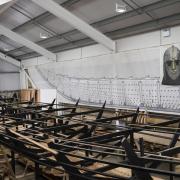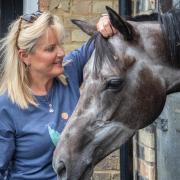Chemotherapy nurse Helen Cook has worked in the Oncology and Haematology Department in Ipswich Hospital for more than 10 years. She is
also one of the founder members of Suffolk Breakthrough Breast Cancer
Chemotherapy nurse Helen Cook has worked in the Oncology and Haematology Department in Ipswich Hospital for more than 10 years. She is also one of the founder members of Suffolk Breakthrough Breast Cancer
“Strange though it may seem, I love my job!” says Helen. “I’m in a privileged position to help people deal with one of the most difficult experiences that life can throw at them. And if I’m doing my job well it can make a big difference to a patient’s experience and their ability to cope with their treatment.” On their first visit, most patients are extremely anxious. Helen says fear of the unknown is usually the main concern. By the end of that first visit, they tend to be more relaxed, having discussed any concerns such as side-effects of treatment and the options of seeing, for example, a dietician or complementary therapy nurse.Ipswich Hospital is one of Breakthrough’s first Service Pledge hospitals where consultants, nurses and all those involved in providing breast cancer treatment and care in the breast units work with patients towards improved breast cancer services. For example ensuring ‘that tests, diagnosis and treatment be given in comfortable settings that preserve dignity and respect the patient's need for privacy’. It’s one more aspect of Breakthrough’s work that can help women undergoing treatment.“We treat a lot of women and a few men who have breast cancer and most of that treatment is adjuvent – to prevent cancer returning or spreading following surgery to remove the tumour,” explains Helen.Although breast cancer is generally thought of as one disease, there are in fact many different types of breast cancer. By identifying characteristics of each particular form of breast cancer, treatments can be tailored to each patient, enabling the oncologist to choose the most effective. “It’s really good to see the benefits of new treatments like Herceptin,” says Helen. “I hope that that in the future there will be many more tailored treatments, further improving survival rates.”At Breakthrough’s research unit at Guy’s Hospital, a team of scientists is investigating a particularly aggressive form of breast cancer called ‘triple negative’ for which there are currently no targeted treatments.The scientists have already discovered genes that may help triple negative tumours to grow. Further research will hopefully be the key to developing new treatments that block cancer growth.
For local support contact: Breast Foot Forward on 07974 502847 or 07786 998704. Coping with Breast Cancer: 0845 601 7152
Breakthrough Breast Cancer: 10 years of pioneering research
What has been Breakthrough Breast Cancer’s biggest achievement of the last ten years?Ten years ago Breakthrough Breast Cancer opened Europe’s largest centre of breast cancer research, the Breakthrough Breast Cancer Research Centre at The Institute of Cancer Research in London. It’s there that scientists have developed new drugs now being used to treat patients and are now analysing the results of the largest and most comprehensive study into the causes of breast cancer. Not surprising then, that a panel of cancer experts rated Breakthrough’s achievements from the past decade as “unmatched and unparalleled.”
What new treatments has Breakthrough developed in the past ten years?Breakthrough’s research into hereditary breast cancer has led to a true revolution in cancer drug development. It began when scientists found that drugs called ‘PARP inhibitors’ efficiently kill cancer cells that v v have faulty breast cancer (BRCA) genes. People who inherit faulty breast cancer genes have a 50-80 percent risk of developing breast cancer in their lifetime. Olaparib, a type of PARP inhibitor, is now showing great promise as a treatment for hereditary breast cancer in patient trials.
What is the charity doing to find out the causes of breast cancer?Ultimately, Breakthrough wants to eradicate breast cancer. And to do that, the causes of the disease need to be known. That’s why the Breakthrough Generations Study has been set up – the world's largest, most comprehensive study into the lifestyle, genetic and environmental causes of breast cancer. Over 100,000 women have joined and are helping to ensure that future generations can live free from fear of the disease. This study could lead to tailor-made health advice to women based on new insights into the causes of breast cancer.
What does the future look like?Breakthrough Breast Cancer’s vision is a future free from the fear of breast cancer. That means outstanding research bringing improved diagnosis, improved treatments designed to fit the needs of each individual patient. And, ultimately, it means stamping out breast cancer for good.


























